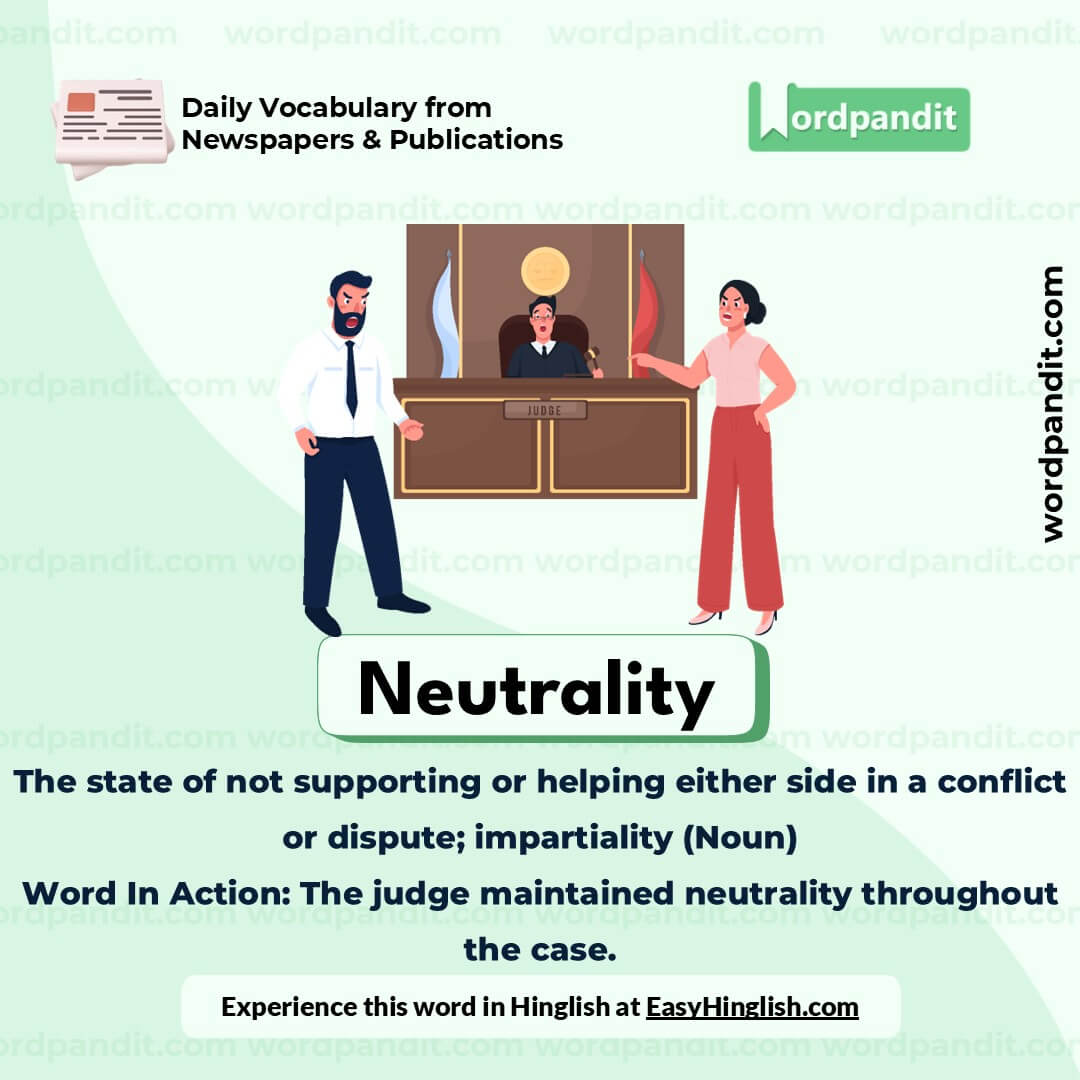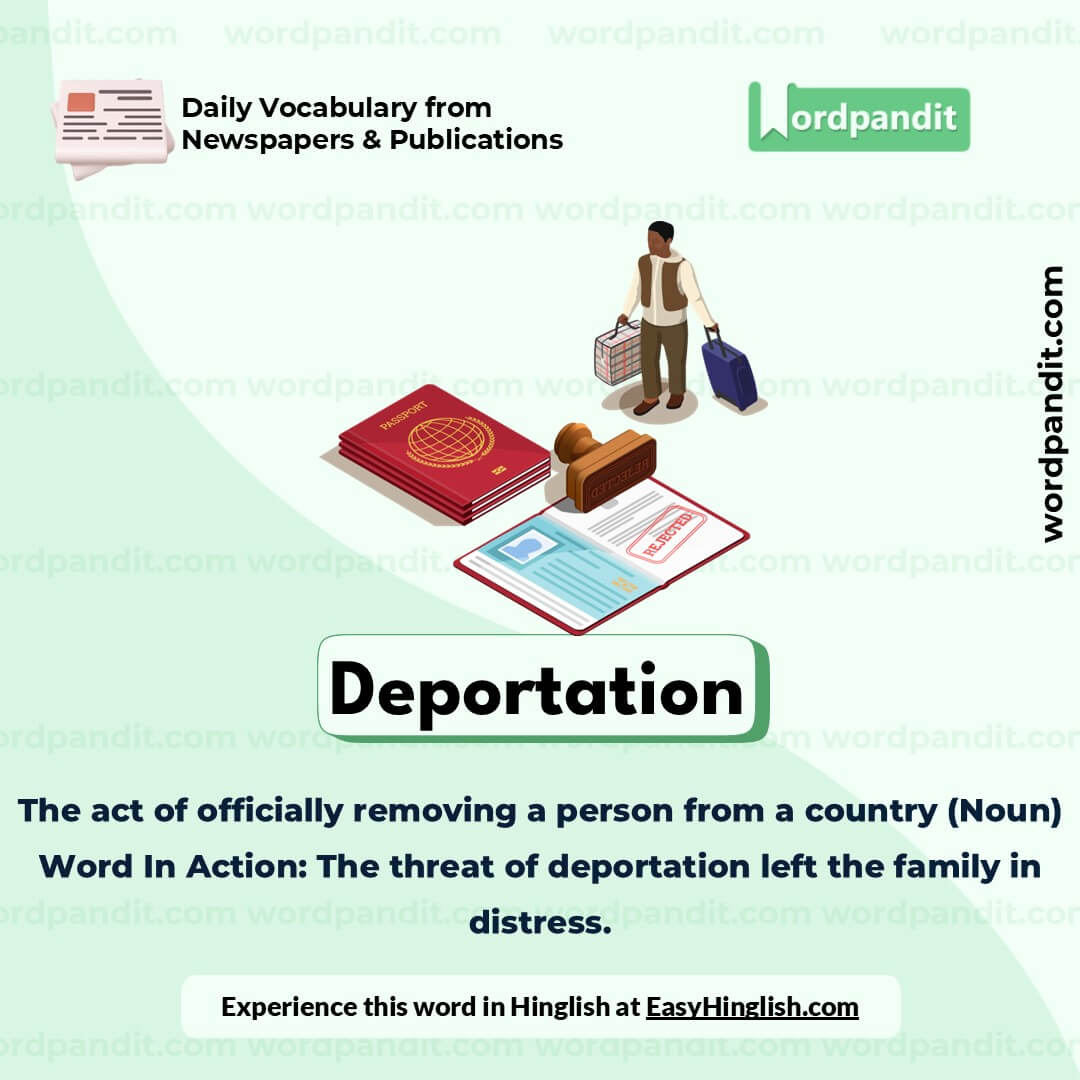Daily Vocabulary from Indian Newspapers and Publications
Welcome to Wordpandit’s Indian Vocabulary Hub
At Wordpandit, we understand the importance of staying rooted in the local context while expanding your language skills. This section focuses on enriching your vocabulary with words and phrases drawn from India’s leading newspapers and publications, ensuring you're learning vocabulary that is practical, relevant, and uniquely Indian.
Why Indian Sources Matter
We believe that the best way to master any language is by immersing yourself in local content. That’s why we carefully curate vocabulary from top Indian publications, including:
- The Hindu
- The Times of India
- The Economic Times
- Hindustan Times
- Live Mint
- The Indian Express
- And many others...
Stay Updated, Stay Relevant
With daily updates from Indian news sources, you’ll be consistently learning words that reflect the trends and shifts in Indian society and culture. Our focus is to provide vocabulary that enhances your understanding of the language in an Indian context.
How Wordpandit Supports Your Goals
Whether you’re preparing for exams, aiming to improve your professional communication, or simply want to stay connected with the latest Indian vocabulary, Wordpandit is here to guide you every step of the way.
Learn with a Practical Approach
Our interactive learning methodology includes real-world examples, engaging activities, and context-specific usage to ensure that every word becomes part of your active vocabulary.
Dive into Indian Vocabulary Today!
Why Choose Wordpandit?
Practical Learning: Focus on words you'll actually encounter in real-world reading, enhancing your comprehension and communication skills.
Diverse Content: From current affairs to scientific breakthroughs, our varied sources expose you to vocabulary across multiple domains.
Effortless Integration: Make Wordpandit a part of your daily routine. Just a few minutes each day can significantly boost your lexicon over time.
Your Path to Vocabulary Mastery
- Visit our Daily Vocabulary section regularly
- Explore new words and their usage in context
- Practice incorporating these words into your own writing and speech
- Track your progress as your vocabulary expands
Start Your Journey Today
Embark on your vocabulary enhancement journey with Wordpandit. By consistently engaging with our daily posts, you'll build a robust vocabulary that serves you well in academic, professional, and personal contexts.
Remember, a word a day keeps linguistic limitations at bay. Make Wordpandit your daily companion in the quest for vocabulary excellence!
WORD-1: Bilateral
Context:
"This year, Finland and India celebrate 75 years of bilateral diplomatic relations." - The Hindu
Explanatory Paragraph:
The word "bilateral" refers to something that involves two sides, parties, or countries. It is often used in political, diplomatic, or legal contexts to describe agreements, discussions, or relationships where both participants share equal involvement or responsibility. For example, bilateral agreements involve cooperation between two nations to address mutual goals.
Meaning: Involving two sides or parties; mutual (Adjective)
Pronunciation: bai-LAT-er-uhl
Difficulty Level: ⭐⭐⭐ Intermediate
Etymology: From the Latin word bi- meaning "two" and latus meaning "side."
Synonyms & Antonyms:
Synonyms: Mutual, reciprocal, two-sided, joint
Antonyms: Unilateral, one-sided, singular
Usage Examples:
- The two countries signed a bilateral trade agreement to boost economic cooperation.
- Bilateral talks between the leaders resulted in significant policy decisions.
- They agreed on a bilateral approach to resolve the conflict peacefully.
- Bilateral relations between India and its neighboring countries have been a cornerstone of foreign policy.
Cultural Reference:
"Bilateral agreements have become a vital part of global diplomacy, fostering cooperation between nations for trade, defense, and cultural exchanges." - Diplomatic Insight Magazine
Think About It:
Why are bilateral relations often considered more stable and effective compared to multilateral agreements?
Quick Activity:
Write down two examples of bilateral agreements that have significantly impacted global diplomacy. Briefly explain their importance.
Memory Tip:
Think of "bi" meaning "two" and "lateral" meaning "side." Bilateral involves two sides working together, just like two hands shaking.
Real-World Application:
The term "bilateral" is frequently used in international relations to describe trade deals, defense pacts, and diplomatic discussions between two countries, highlighting cooperation and shared goals.
WORD-2: Neutrality
Context:
"Neutrality was the key word. There was a Treaty of Friendship and Mutual Assistance with the Soviet Union, but Finland was a Nordic democracy with Western values." - The Hindu
Explanatory Paragraph:
The word "neutrality" refers to the state of not taking sides in a conflict, disagreement, or competition. It is often used in political, diplomatic, or military contexts to describe a country, organization, or individual that remains impartial. Neutrality allows for balanced decision-making, avoiding favoritism or bias, and fostering peace and cooperation in sensitive situations.
Meaning: The state of not supporting or helping either side in a conflict or dispute; impartiality (Noun)
Pronunciation: noo-TRAL-uh-tee
Difficulty Level: ⭐⭐⭐ Intermediate
Etymology: From the Latin word neutralis, meaning "of neither side," derived from neuter ("neither").
Synonyms & Antonyms:
Synonyms: Impartiality, nonalignment, objectivity, detachment
Antonyms: Bias, partisanship, alignment, favoritism
Usage Examples:
- Switzerland is known for its longstanding neutrality during global conflicts.
- The referee's neutrality ensured a fair outcome in the match.
- Neutrality in journalism is essential for maintaining credibility and trust.
- The country’s neutrality allowed it to act as a mediator between conflicting nations.
Cultural Reference:
"Neutrality has often been associated with Switzerland, a country that remained impartial during both World Wars, establishing itself as a hub for diplomacy and peace negotiations." - World Diplomatic Studies Journal
Think About It:
How can neutrality benefit a nation, and in what situations might it become a disadvantage?
Quick Activity:
List three historical events where neutrality played a significant role. Explain the impact of neutrality in each case.
Memory Tip:
Remember "neutrality" by linking it to a "neutral gear" in a car—just as neutral gear doesn't move forward or backward, neutrality avoids taking sides.
Real-World Application:
Neutrality is often adopted by nations, organizations, or individuals to mediate conflicts, remain unbiased in decisions, or uphold principles of fairness, particularly in diplomacy, journalism, and legal systems.
WORD-3: Deportation
Context:
"In the early 1980s, Colombo sought the deportation of Prabhakaran to Sri Lanka after the infamous shoot-out at Pondy Bazaar in Chennai on May 19, 1982. Then, India sought his extradition after Rajiv Gandhi was killed." - The Hindu
Explanatory Paragraph:
The word "deportation" refers to the formal process of expelling a person from a country, typically because they have violated immigration laws or are deemed a threat to national security. Deportation is carried out by government authorities and often involves returning the individual to their country of origin. It plays a critical role in maintaining immigration policies and addressing legal violations.
Meaning: The act of officially removing a person from a country (Noun)
Pronunciation: dee-por-TAY-shun
Difficulty Level: ⭐⭐⭐ Intermediate
Etymology: From the Latin word deportare, meaning "to carry away," where de- means "away" and portare means "to carry."
Synonyms & Antonyms:
Synonyms: Expulsion, removal, extradition, banishment
Antonyms: Immigration, repatriation, naturalization, asylum
Usage Examples:
- The government ordered the deportation of individuals who entered the country illegally.
- After the investigation, the suspect faced deportation to his home country.
- Deportation laws are often a point of contention in international relations.
- The deportation of refugees raised concerns about human rights violations.
Cultural Reference:
"The deportation of individuals during political conflicts has historically been a contentious and sensitive issue, as seen in numerous global crises throughout history." - International Human Rights Journal
Think About It:
What are the ethical and humanitarian challenges associated with deportation, and how can nations balance law enforcement with compassion?
Quick Activity:
Research a famous historical event involving deportation. Write a brief paragraph explaining its causes and consequences.
Memory Tip:
Remember "deportation" by breaking it into "de-" (away) and "port" (carry). Deportation involves "carrying someone away" to their home country or another location.
Real-World Application:
Deportation is a critical legal process used to manage immigration violations, address criminal activities, and enforce national security measures. However, it requires careful consideration of international laws and humanitarian principles.
WORD-4: Extradition
Context:
"In the early 1980s, Colombo sought the deportation of Prabhakaran to Sri Lanka after the infamous shoot-out at Pondy Bazaar in Chennai on May 19, 1982. Then, India sought his extradition after Rajiv Gandhi was killed." - The Hindu
Explanatory Paragraph:
The word "extradition" refers to the formal process by which one country hands over a person accused or convicted of a crime to another country where the crime was committed. It is based on legal agreements or treaties between nations and ensures that individuals cannot escape justice by crossing borders.
Meaning: The official process of delivering a person accused or convicted of a crime to another country (Noun)
Pronunciation: ex-truh-DISH-uhn
Difficulty Level: ⭐⭐⭐ Intermediate
Etymology: From the Latin word ex ("out") and tradere ("to hand over"), meaning "to hand someone over."
Synonyms & Antonyms:
Synonyms: Repatriation, deportation, rendition, handover
Antonyms: Asylum, refuge, protection, shelter
Usage Examples:
- The government approved the extradition of the fugitive to face charges in his home country.
- Under the treaty, both nations agreed to cooperate in matters of extradition.
- His lawyers argued against his extradition, claiming he would not receive a fair trial.
- The extradition process can take months due to legal and diplomatic complexities.
Cultural Reference:
"Extradition treaties are critical tools for ensuring criminals cannot evade justice, as seen in global efforts to capture notorious criminals like Julian Assange and Carlos the Jackal." - International Law Review
Think About It:
How can extradition agreements between countries help strengthen international justice systems, and what challenges might arise in implementing them?
Quick Activity:
Research two well-known extradition cases. Summarize the reasons for the extradition request and its outcome.
Memory Tip:
Remember "extradition" by linking it to "exit" and "tradition"—it’s the tradition of making someone "exit" to another country to face justice.
Real-World Application:
Extradition plays a key role in global law enforcement, ensuring that criminals cannot escape prosecution by fleeing to other countries. It also promotes cooperation and trust between nations.
WORD-5: Infamous
Context:
"In the early 1980s, Colombo sought the deportation of Prabhakaran to Sri Lanka after the infamous shoot-out at Pondy Bazaar in Chennai on May 19, 1982. Then, India sought his extradition after Rajiv Gandhi was killed." - The Hindu
Explanatory Paragraph:
The word "infamous" describes something or someone well-known for a negative reason, such as a crime, scandal, or unethical act. It conveys a reputation marked by disgrace, shame, or notoriety. For example, a historical event or person becomes infamous due to actions that are widely condemned or criticized.
Meaning: Well-known for something bad; having a bad reputation (Adjective)
Pronunciation: IN-fuh-muhs
Difficulty Level: ⭐⭐ Beginner
Etymology: From Latin infamis, meaning "of ill fame," where in- means "not" and fama means "reputation" or "fame."
Synonyms & Antonyms:
Synonyms: Notorious, disreputable, scandalous, nefarious
Antonyms: Famous, reputable, honorable, distinguished
Usage Examples:
- The infamous criminal was finally captured after years of evading the authorities.
- The infamous event sparked outrage and led to major political reforms.
- His infamous remarks during the debate drew widespread criticism.
- The city is infamous for its high crime rates and lack of infrastructure.
Cultural Reference:
"The infamous Watergate scandal in the 1970s led to the resignation of U.S. President Richard Nixon, highlighting the importance of accountability in politics." - Political History Journal
Think About It:
Can a person or event transition from being infamous to being viewed positively over time? If so, how?
Quick Activity:
List three infamous historical events or figures and briefly explain why they are considered infamous.
Memory Tip:
Remember "infamous" as "in-fame-us"—someone or something that is famous in a negative way.
Real-World Application:
The word "infamous" is often used in news reports, documentaries, and discussions to describe events, actions, or individuals that have left a negative impact on society or history.


















